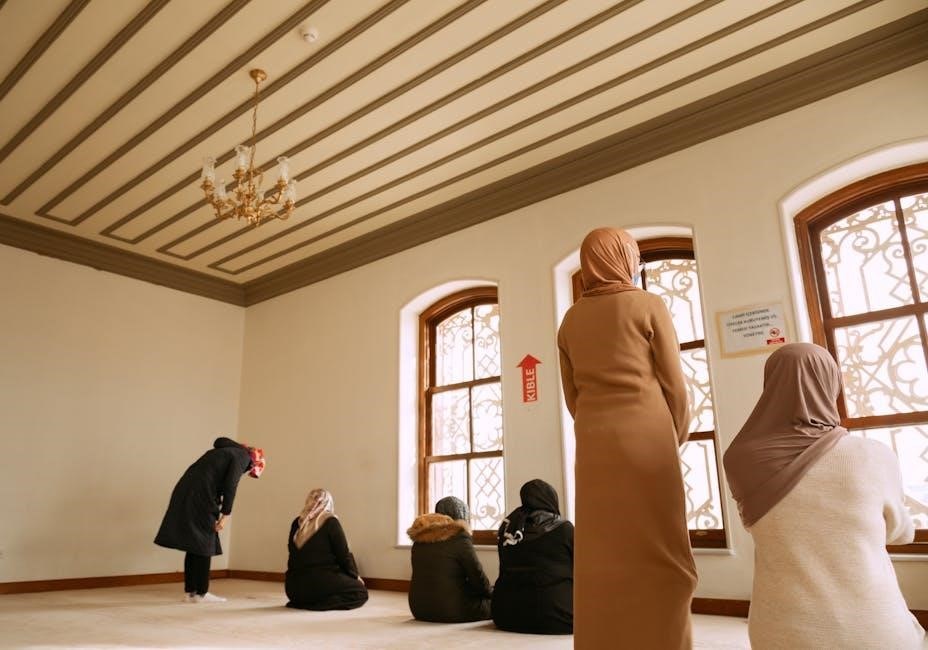Being Muslim: A Practical Guide by Asad Tarsin is a comprehensive guide designed to help individuals understand and practice Islam effectively. It covers essential beliefs, worship practices, and daily lifestyle guidance, making it an invaluable resource for both new Muslims and those seeking to deepen their faith. The book emphasizes practicality, providing clear and accessible knowledge to navigate the fundamentals of Islam with confidence.
Overview of the Book
Being Muslim: A Practical Guide is a comprehensive manual authored by Asad Tarsin, offering insights into Islamic beliefs, practices, and lifestyle. Published in 2015, the 312-page book serves as an accessible resource for both new and lifelong Muslims, providing clarity on faith fundamentals and daily applications. It bridges theory and practice, making it an essential guide for understanding and living Islam thoughtfully.
Target Audience and Purpose
Being Muslim: A Practical Guide is tailored for new Muslims, those returning to the faith, and lifelong Muslims seeking clarity. Its purpose is to provide a clear, accessible manual for living Islam, focusing on essential practices and beliefs. Ideal for personal study or educational programs, it helps bridge theory and practice, making it a valuable resource for understanding and applying Islamic teachings effectively.

Author Background
Asad Tarsin, an Islamic scholar and educator, holds a degree from the University of Michigan and studied under prominent scholars. He specializes in creating educational programs for Muslims, focusing on practical faith application and spiritual growth, making him a trusted authority in Islamic education and community development.
Asad Tarsin’s Expertise in Islamic Studies
Asad Tarsin is a renowned Islamic scholar with over a decade of experience in designing educational programs and teaching Islamic theology, sacred law, and spirituality. His expertise spans various fields, including Islamic studies, philosophy, and education. He has studied under prominent scholars like Shaykh Hamza Yusuf and Dr. Sherman Jackson, ensuring a deep understanding of both classical and contemporary Islamic thought. His work focuses on making complex concepts accessible, particularly for new and returning Muslims, through practical and sustainable educational models. Tarsin’s approach emphasizes the integration of spiritual and legal aspects of Islam, providing a holistic understanding of the faith. His contributions to Islamic education have made him a respected figure in the Muslim community, known for his ability to bridge traditional knowledge with modern contexts.
His Contributions to Islamic Education
Asad Tarsin has significantly contributed to Islamic education through his book and curriculum development. His work focuses on creating accessible, practical resources for Muslims, particularly newcomers, to understand and implement Islamic teachings effectively. Tarsin has designed educational programs and served as a curriculum director, ensuring a structured approach to learning Islam. His efforts have made Islamic education more engaging and comprehensible for diverse audiences.

Core Islamic Beliefs
Core Islamic beliefs include the Testimony of Faith, belief in Allah, angels, scriptures, the Day of Judgment, and Divine Decree, forming the foundation of Muslim faith.
The Testimony of Faith (Shahadah)
The Shahadah is the declaration of faith, stating “There is no god but Allah, and Muhammad is the Messenger of Allah.” It is the first pillar of Islam, embodying the core belief in Allah’s oneness and Muhammad’s prophethood, serving as the foundation of a Muslim’s identity and commitment to the faith.
Understanding God (Allah), Angels, and Scriptures
In Islam, Allah is the one, all-powerful, and merciful creator. Muslims believe in divine scriptures, including the Quran, Torah, Psalms, and Gospel, with the Quran as the final, unchanged revelation. Angels, like Jibreel, serve as messengers and agents of Allah’s will. This belief forms the cornerstone of Islamic theology, guiding followers in worship, morality, and their relationship with the divine.
The Day of Judgment and Divine Decree (Qadr)
Muslims believe in the Day of Judgment (Qiyamah), when all souls will be held accountable for their deeds. Divine Decree (Qadr) refers to Allah’s eternal knowledge and will, encompassing all events, including destiny. This belief emphasizes submission to Allah’s plan, fostering trust and responsibility in adhering to divine guidance, while preparing for the ultimate reckoning and eternal life in paradise or hell.
Practices of Worship
Practices of Worship in Islam include the Five Pillars: Prayer (Salah), Zakah (charity), Fasting (Sawm), and Hajj (pilgrimage). These acts establish a direct connection with Allah, fostering spiritual growth and communal unity, while reflecting submission to divine will.
The Five Pillars of Islam: Prayer (Salah), Zakah, Fasting (Sawm), and Hajj
The Five Pillars form the cornerstone of Islamic practice, guiding Muslims in their devotion. Salah (prayer) involves five daily prayers, fostering mindfulness and connection with Allah. Zakah (charity) purifies wealth and supports the community. Sawm (fasting) during Ramadan builds self-control and empathy. Hajj (pilgrimage) to Makkah unites believers globally, symbolizing equality and spiritual renewal. Together, these practices cultivate faith and righteousness.
Additional Acts of Worship and Their Significance
Beyond the Five Pillars, Muslims engage in voluntary acts like Qiyam al-Layl (night prayer) and Duha (morning prayer), which strengthen spiritual connection. Optional fasting, such as during Shawwal or Muharram, enhances self-discipline. Sadaqah (charity) and Dhikr (remembrance of Allah) cultivate gratitude and mindfulness. These practices deepen faith, foster community bonds, and provide opportunities for personal growth, enriching one’s spiritual journey and relationship with Allah.
Specific Rulings for Women in Worship
The book addresses specific rulings for women in worship, emphasizing modesty and dignity. It covers guidelines for prayer during menstruation, postpartum bleeding, and other unique circumstances. Women’s participation in congregational prayers and their roles in religious gatherings are also discussed, ensuring their spiritual needs are met while respecting Islamic norms. These rulings facilitate women’s active engagement in worship, balancing tradition with practicality.
Spiritual Refinement and Character Development
The book explores the path to self-improvement, highlighting the balance between faith and practice. It guides readers in cultivating noble traits and overcoming destructive vices, fostering ethical growth.
Understanding Human Consciousness and the Path to Self-Improvement
The book delves into the nature of human consciousness, offering insights into the soul’s potential for growth. It outlines a clear path to self-improvement, emphasizing the importance of introspection, moral awareness, and spiritual discipline. Readers are guided to recognize their inner struggles and develop strategies to overcome them, aligning their actions with Islamic teachings for a balanced and virtuous life.
Destructive Vices and Saving Virtues
The book identifies major destructive vices such as envy, pride, and greed, explaining their harmful effects on spiritual growth. It contrasts these with saving virtues like gratitude, humility, and compassion, providing practical advice on cultivating these qualities. The approach is balanced, offering both warnings against vices and encouragement to embrace virtues, helping readers transform their character and deepen their faith.
Cultivating Noble Character Traits
The book emphasizes the importance of developing noble character traits such as honesty, kindness, and patience. It provides practical advice on how to reflect on one’s actions and mindset, offering guidance on mindfulness and self-awareness. By fostering these virtues, readers can align their behavior with Islamic values, creating a balanced and compassionate lifestyle that honors their faith and benefits others.

The Role of the Prophet Muhammad ﷺ
The book highlights Prophet Muhammad ﷺ as a divine guide and moral exemplar, emphasizing his teachings on compassion, justice, and humility. His life serves as a timeless model for believers, illustrating how to implement Islamic values in daily life while maintaining a balanced and righteous existence.
His Biography and Miracles
The book outlines the Prophet Muhammad’s ﷺ life, from his noble birth to his prophethood, emphasizing his miracles like the Night Journey and the Quran’s revelation. It highlights his compassionate character, wisdom, and divine guidance, illustrating how his life exemplifies Islamic values and serves as a model for believers.
The Importance of Sending Blessings (Salawat) Upon the Prophet
Sending blessings upon the Prophet Muhammad ﷺ is a devotional act that strengthens one’s connection to him and invokes divine mercy. It reflects gratitude for his guidance and embodies love for his teachings. This practice, rooted in Islamic tradition, fosters spiritual growth and unity among believers, encouraging adherence to his noble example in daily life and worship.
The Quran: Guidance for Muslims
The Quran is the literal word of God, revealed as guidance for humanity. It provides timeless wisdom, covering beliefs, practices, and ethical conduct, serving as both spiritual and practical guidance for Muslims.
The Nature and Preservation of the Quran
The Quran is the sacred scripture of Islam, believed to be the literal word of God as revealed to Prophet Muhammad ﷺ. Its preservation is miraculous, maintained through memorization and written records since its revelation. Muslims holds it in high esteem, considering it a source of divine guidance and wisdom, essential for spiritual and practical aspects of life.
Major Themes and Their Relevance to Daily Life
The Quran emphasizes themes like justice, compassion, gratitude, and trust in God. These concepts guide Muslims in ethical decision-making, fostering moral character, and building harmonious relationships. By applying these teachings, individuals can navigate life’s challenges with faith and integrity, ensuring their actions align with divine wisdom and promote a balanced, righteous lifestyle in modern society.
Islamic Holy Days and Lifestyle
Exploring the significance of Ramadan, Eid al-Fitr, and Eid al-Adha, this section highlights how these holy days shape a Muslim’s spiritual and communal life, fostering reflection and celebration.
Significance of Ramadan, Eid al-Fitr, and Eid al-Adha
Ramadan, a month of fasting, fosters self-reflection and devotion. Eid al-Fitr celebrates the fast’s end with gratitude, while Eid al-Adha honors sacrifice and charity. These holy days strengthen faith, family bonds, and communal unity, embodying Islam’s spiritual and social essence.
Living According to Islamic Law (Sharia) in Daily and Communal Life
Sharia, or Islamic law, guides Muslims in personal conduct, worship, and societal interactions. It emphasizes justice, compassion, and moral integrity, creating a harmonious balance between individual and communal responsibilities. By applying Sharia, Muslims cultivate a righteous lifestyle, fostering a just and ethical society that reflects Islamic values in everyday actions and shared obligations.

Additional Resources for Learning
The book includes a glossary of terms, recommended readings, and Quranic reflections to deepen understanding and facilitate further exploration of Islamic principles and practices effectively.
Recommended Readings and Glossary of Terms
The book provides a detailed glossary of Islamic terminology, ensuring clarity for readers unfamiliar with key concepts. Additionally, it offers recommended readings for further exploration and a bibliography for advanced learning. Selections from the Quran are included for reflection, enhancing spiritual understanding and practical application of Islamic teachings in daily life.
Selections from the Quran for Reflection
The book includes carefully chosen verses from the Quran, providing spiritual guidance and fostering deeper reflection. These selections highlight key themes such as God’s attributes, human responsibility, and moral guidance. They serve as a bridge between faith and practice, helping readers connect Islamic teachings to their daily lives and spiritual growth.
Being Muslim: A Practical Guide is a vital resource for understanding Islam, offering clarity and accessibility. It empowers individuals to embrace their faith with confidence and purpose.
The Book’s Impact on Muslim Communities
Being Muslim: A Practical Guide has become a transformative resource for Muslim communities worldwide. It bridges gaps in understanding, offering clear guidance that resonates with both new and lifelong Muslims. The book’s accessible approach has made it a cornerstone for educational programs, fostering unity and strengthening faith. Its influence continues to grow, enriching spiritual journeys and daily practices.
Final Thoughts on Practicing Islam
Being Muslim: A Practical Guide offers timeless wisdom, emphasizing the balance between spiritual growth and daily life. It encourages believers to embrace Islam holistically, integrating faith into every aspect of their existence. The book’s clarity and accessibility make it a cherished resource, helping Muslims worldwide to deepen their connection with Allah and live authentically as followers of the Prophet Muhammad ﷺ.